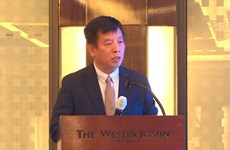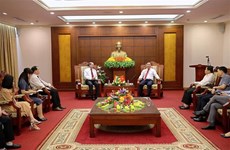Vietnam backs APEC development agenda
Vietnam fully supports the measures required to fulfil the Bali
commitments and Bogor goals.
Vietnam fully supports the measures required in order to fulfil the Bali
commitments and Bogor goals, as well as the facilitation and
liberalisation of trade and investment, President Truong Tan Sang stated
at the 22nd Asia-Pacific Economic Cooperation (APEC) Economic
Leaders’ Meeting in Beijing, China on November 11.
To guarantee effective regional connections, the President called for stronger efforts to achieve the United Nations Millennium Development Goals, devise a post-2015 development agenda and address global challenges.
APEC should intensify economic and technical cooperation while joining and supporting regional initiatives to boost interconnections, including the Association of Southeast Asian Nations and the Greater Mekong Subregion, he said.
With negotiations on 15 free trade deals expected to end by 2020, Vietnam is set to become a key link in an expansive economic network, including 18 APEC member economies, he added.
In his opening speech, Chinese President Xi Jinping announced that China would contribute 10 million USD to capacity development projects in APEC’s developing economies.
During the plenary session “Promoting regional economic connectivity”, leaders agreed that APEC was in a prime position to shape the future via the Asian-Pacific partnership, which will create an open economic space that fosters innovation and inclusive growth.
Since its establishment 25 years ago, APEC has reduced tariffs from 16.9 percent to 5.7 percent, and increased internal trade six-fold to 9.9 trillion USD. Joint efforts on climate change, food and energy security, maritime issues, and green growth have borne fruits.
Participants vowed to boost APEC’s role as a forum for sustainable economic growth and prosperity, as well as an open trade and investment environment in the Asian-Pacific region.
The 21-member organisation comprises the 12 economies currently negotiating the Trans-Pacific Partnership agreement, namely Australia, Brunei, Canada, Chile, Japan, Malaysia, Mexico, New Zealand, Peru, Singapore, the United States and Vietnam, along with China, Hong Kong (China), Indonesia, the Republic of Korea, Papua New Guinea, the Philippines, Russia, Taiwan (China) and Thailand.
APEC represents approximately 40 percent of the world’s population, 57 percent of global economic output and 48 percent of total trade.-VNA
To guarantee effective regional connections, the President called for stronger efforts to achieve the United Nations Millennium Development Goals, devise a post-2015 development agenda and address global challenges.
APEC should intensify economic and technical cooperation while joining and supporting regional initiatives to boost interconnections, including the Association of Southeast Asian Nations and the Greater Mekong Subregion, he said.
With negotiations on 15 free trade deals expected to end by 2020, Vietnam is set to become a key link in an expansive economic network, including 18 APEC member economies, he added.
In his opening speech, Chinese President Xi Jinping announced that China would contribute 10 million USD to capacity development projects in APEC’s developing economies.
During the plenary session “Promoting regional economic connectivity”, leaders agreed that APEC was in a prime position to shape the future via the Asian-Pacific partnership, which will create an open economic space that fosters innovation and inclusive growth.
Since its establishment 25 years ago, APEC has reduced tariffs from 16.9 percent to 5.7 percent, and increased internal trade six-fold to 9.9 trillion USD. Joint efforts on climate change, food and energy security, maritime issues, and green growth have borne fruits.
Participants vowed to boost APEC’s role as a forum for sustainable economic growth and prosperity, as well as an open trade and investment environment in the Asian-Pacific region.
The 21-member organisation comprises the 12 economies currently negotiating the Trans-Pacific Partnership agreement, namely Australia, Brunei, Canada, Chile, Japan, Malaysia, Mexico, New Zealand, Peru, Singapore, the United States and Vietnam, along with China, Hong Kong (China), Indonesia, the Republic of Korea, Papua New Guinea, the Philippines, Russia, Taiwan (China) and Thailand.
APEC represents approximately 40 percent of the world’s population, 57 percent of global economic output and 48 percent of total trade.-VNA













